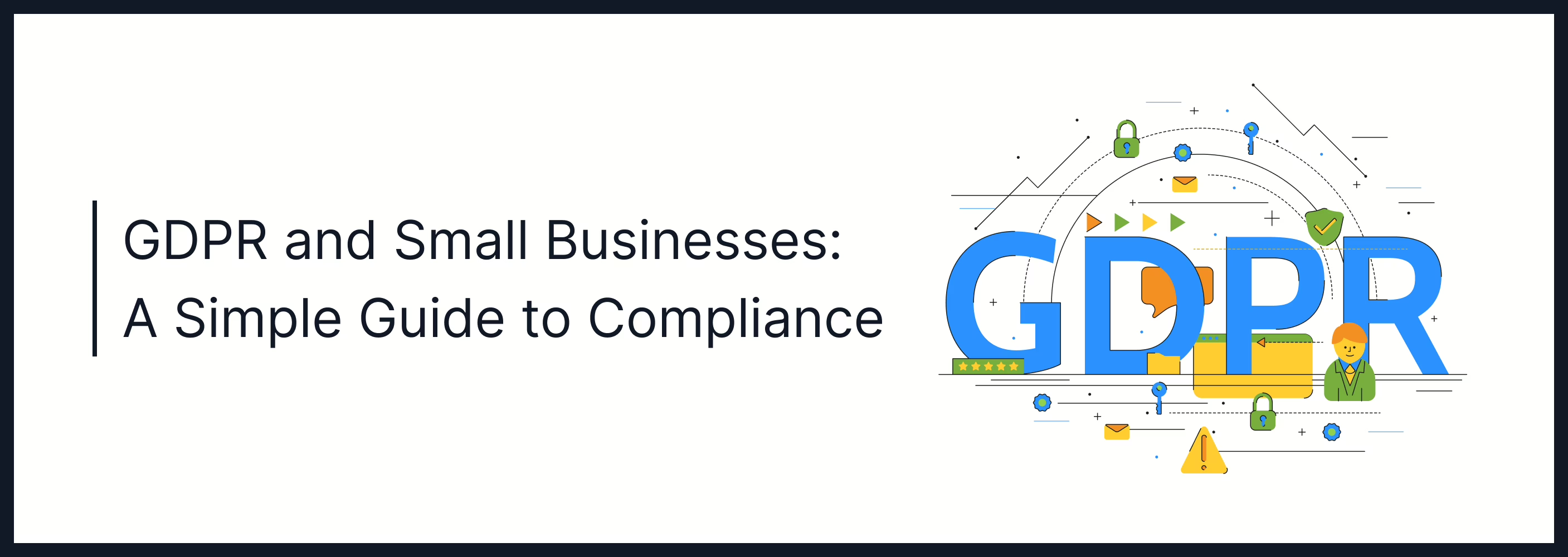
Oct 15, 2024 Information hub
GDPR and Small Businesses: A Simple Guide to Compliance and Benefits
In today’s digital age, data is one of the most valuable assets for businesses, regardless of their size. However, with the increasing reliance on data comes the responsibility to protect it. The General Data Protection Regulation (GDPR), which came into effect on May 25, 2018, is a landmark regulation designed to protect the personal data of individuals within the European Union (EU). While large corporations often have the resources to ensure compliance, small businesses may find GDPR compliance more challenging.
This blog post will explore the significance of GDPR for small businesses, the challenges they face, and the steps they can take to ensure compliance. We will also discuss the benefits of GDPR compliance and how it can positively impact small businesses in the long run.
What is GDPR?
The General Data Protection Regulation (GDPR) is a legal framework that sets guidelines for the collection and processing of personal information from individuals who live in the European Union (EU). It applies to any organization that processes the personal data of EU citizens, regardless of where the organization is based. This means that even small businesses outside the EU must comply with GDPR if they handle the personal data of EU residents.
Key Principles of GDPR
GDPR is built on several key principles that businesses must adhere to:
- Lawfulness, fairness, and transparency: Personal data must be processed lawfully, fairly, and in a transparent manner.
- Purpose limitation: Data should only be collected for specified, explicit, and legitimate purposes.
- Data minimization: Only the data necessary for the intended purpose should be collected.
- Accuracy: Personal data must be accurate and kept up to date.
- Storage limitation: Data should not be kept for longer than necessary.
- Integrity and confidentiality: Personal data must be processed in a manner that ensures appropriate security.
- Accountability: Businesses must be able to demonstrate compliance with GDPR.
Why GDPR Matters for Small Businesses
Relevance of GDPR Today
In the years since GDPR was introduced, data privacy has become a critical issue for businesses of all sizes. Consumers are more aware of their rights and expect businesses to handle their personal data responsibly. Non-compliance with GDPR can result in significant fines, which can be devastating for small businesses.
According to the European Data Protection Board (EDPB), fines for GDPR violations can reach up to €20 million or 4% of a company’s global annual turnover, whichever is higher. For small businesses, even smaller fines can have a significant financial impact.
Moreover, GDPR compliance is not just about avoiding fines. It’s about building trust with customers. A survey by Cisco found that 84% of consumers care about data privacy and want more control over how their data is used. Small businesses that prioritize data protection can differentiate themselves from competitors and build stronger relationships with their customers.
Challenges Small Businesses Face with GDPR Compliance
1. Limited Resources
One of the biggest challenges small businesses face when it comes to GDPR compliance is limited resources. Unlike large corporations, small businesses often don’t have dedicated legal or compliance teams. This can make it difficult to understand the complexities of GDPR and implement the necessary changes.
2. Lack of Awareness
Many small business owners are not fully aware of their obligations under GDPR. A study by the Federation of Small Businesses (FSB) found that 33% of small businesses were unaware of GDPR, and 35% were unsure if it applied to them. This lack of awareness can lead to unintentional non-compliance.
3. Data Management
GDPR requires businesses to have a clear understanding of the personal data they collect, how it is processed, and where it is stored. For small businesses that may not have sophisticated data management systems, this can be a daunting task.
4. Ongoing Compliance
GDPR compliance is not a one-time task. Businesses must continuously monitor their data processing activities and ensure they remain compliant. This can be challenging for small businesses that are already stretched thin with day-to-day operations.
Practical Steps for Small Businesses to Achieve GDPR Compliance
While GDPR compliance may seem overwhelming, there are practical steps small businesses can take to ensure they meet their obligations.
1. Conduct a Data Audit
The first step towards GDPR compliance is understanding what personal data your business collects, how it is processed, and where it is stored. Conducting a data audit will help you identify any areas where you may be non-compliant and take corrective action.
- Identify the types of personal data you collect (e.g., names, email addresses, payment information).
- Determine how the data is collected (e.g., through website forms, email, or in-person).
- Assess how the data is stored and processed (e.g., in a CRM system, cloud storage, or physical files).
- Review who has access to the data and whether they need that access.
2. Update Privacy Policies
GDPR requires businesses to provide clear and transparent information about how they collect and use personal data. This information should be included in your privacy policy. Make sure your privacy policy is easy to understand and accessible to your customers.
Your privacy policy should include:
- The types of personal data you collect.
- The purposes for which the data is collected.
- How long the data will be retained.
- The legal basis for processing the data (e.g., consent, contract, legal obligation).
- Information about individuals’ rights under GDPR (e.g., the right to access, rectify, or delete their data).
3. Obtain Consent
Under GDPR, businesses must obtain explicit consent from individuals before collecting their personal data. Consent must be freely given, specific, informed, and unambiguous. This means that pre-ticked boxes or vague statements are not sufficient.
To ensure compliance:
- Use clear and simple language when asking for consent.
- Provide individuals with the option to withdraw their consent at any time.
- Keep records of when and how consent was obtained.
4. Implement Data Security Measures
GDPR requires businesses to implement appropriate technical and organizational measures to protect personal data. This includes protecting data from unauthorized access, loss, or destruction.
Some practical steps small businesses can take include:
- Encrypting sensitive data to protect it from unauthorized access.
- Using strong passwords and two-factor authentication for systems that store personal data.
- Regularly updating software to protect against security vulnerabilities.
- Training employees on data protection best practices.
5. Appoint a Data Protection Officer (DPO)
While not all small businesses are required to appoint a Data Protection Officer (DPO), it may be beneficial to designate someone within your organization to oversee GDPR compliance. This person can be responsible for conducting data audits, updating privacy policies, and ensuring that data security measures are in place.
6. Respond to Data Subject Requests
Under GDPR, individuals have the right to access their personal data, request corrections, and ask for their data to be deleted. Small businesses must have processes in place to respond to these requests in a timely manner (within one month).
To ensure compliance:
- Set up a system for receiving and responding to data subject requests.
- Train employees on how to handle these requests.
- Keep records of all requests and how they were handled.
Benefits of GDPR Compliance for Small Businesses
While GDPR compliance may seem like a burden, it can actually offer several benefits for small businesses.
1. Building Trust with Customers
Consumers are increasingly concerned about how their personal data is used. By complying with GDPR, small businesses can demonstrate their commitment to data protection and build trust with their customers. This can lead to increased customer loyalty and a competitive advantage.
2. Reducing the Risk of Data Breaches
Data breaches can be costly, both in terms of financial penalties and damage to a business’s reputation. By implementing the security measures required by GDPR, small businesses can reduce the risk of data breaches and protect their reputation.
3. Streamlining Data Management
GDPR requires businesses to have a clear understanding of the personal data they collect and how it is processed. This can lead to more efficient data management practices, which can save time and resources in the long run.
4. Avoiding Fines
Perhaps the most obvious benefit of GDPR compliance is avoiding the hefty fines that can result from non-compliance. For small businesses, even a small fine can have a significant financial impact, so it’s important to take GDPR compliance seriously.
Current Trends and Future Developments in GDPR
1. Increased Enforcement
Since GDPR came into effect, enforcement has been steadily increasing. In 2021, the European Data Protection Board (EDPB) reported a 113% increase in fines compared to the previous year. As regulators continue to crack down on non-compliance, small businesses must ensure they are meeting their obligations.
2. Global Impact of GDPR
While GDPR is an EU regulation, its impact is being felt worldwide. Many countries, including Brazil, Japan, and South Korea, have introduced similar data protection laws. This trend is likely to continue, meaning that small businesses that operate internationally will need to stay up to date with data protection regulations in multiple jurisdictions.
3. Evolving Technology
As technology continues to evolve, so too will the challenges of GDPR compliance. The rise of artificial intelligence (AI), machine learning, and big data analytics presents new challenges for data protection. Small businesses will need to stay informed about how these technologies impact their GDPR obligations.
Conclusion
GDPR compliance is essential for small businesses that handle the personal data of EU residents. While it may seem daunting, taking the necessary steps to comply with GDPR can help small businesses build trust with their customers, reduce the risk of data breaches, and avoid costly fines.
To summarize, small businesses should:
- Conduct a data audit to understand what personal data they collect and how it is processed.
- Update their privacy policies to ensure transparency.
- Obtain explicit consent from individuals before collecting their data.
- Implement data security measures to protect personal data.
- Appoint a Data Protection Officer (if necessary) and respond to data subject requests in a timely manner.
By taking these steps, small businesses can not only ensure GDPR compliance but also position themselves for long-term success in an increasingly data-driven world.
Actionable Takeaways:
- Conduct a thorough data audit to identify potential compliance gaps.
- Update your privacy policy to reflect GDPR requirements.
- Implement strong data security measures to protect personal data.
- Stay informed about evolving data protection regulations and technologies.
By prioritizing GDPR compliance, small businesses can protect their customers’ data, build trust, and avoid costly penalties.
